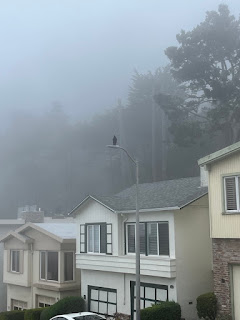An authentic voice
Before the pandemic, I was a serious, semi-professional singer. I stopped singing in March 2020, though, and have only been able to sing a handful of times since. It's too hopeful an activity, to heave your breath up and down, to let go of enough emotion and worry to let the sound flow free. That's where my fear lives now.
-From "How do we undo fear?" April 15, 2022
Earlier this year, I wrote a blog post about the somatics of fear and how the grief of the last few years had made it difficult to sing again. I later shared the post with a friend who looked me in the face and said, "Well, why don't you just start taking lessons again and get over it?" Her question felt glib for about two seconds and then resolved into some hard truth. Yes, why don't you, Kit? Hiding from the problem certainly wasn't helping.
So I signed up for voice lessons again, reconnecting with my old teacher who'd been deluged with his own trauma--and have since spent every lesson failing to keep my eyes dry. If you don't sing, this likely sounds ridiculous. Truly, get over it, Kit. If you sing, though, you know how vulnerable it can be to let yourself feel and then express true emotion. (Though, yes, it’s still ridiculous.)
When I was 14, I began having problems with my singing voice. I was a high soprano who suddenly began croaking when I hit my upper register. I got tested for nodules; they found nothing, and I spent the next 30 years assuming that I was defective. I developed workarounds that confined the problem to my upper transition notes, but not always. Instead, I built up a layer of shame and embarrassment that was impossible to extricate from this thing I loved, singing.
At my voice teacher's advice, I finally went to get re-examined by a doctor in August. I was terrified that the doctor would once again find nothing and have no advice. Thankfully, she did understand what was happening and did have advice on how to fix it. And so of all the things to shed tears over from the last few years, there I was sitting in a strangely upright chair in a doctor's office, leaking with what was closer to shame than relief. This had always been fixable, it turned out. The problem was me: I hadn't tried hard enough to find the solution.
The fix, in essence, was about undoing shocking levels of tension in my neck and face, breathing, and singing with my authentic voice. Aka, stop being so uptight and stop hiding.
If you're a woman in your 40s, particularly if you're married to a man, and even more particularly if you're in marriage therapy, you can see how deep this hits. I started blogging here and writing fiction for myself in the early Trump years as a way of channeling all the rage and despair I was feeling at the time. I wrote three in-the-drawer novels during that period, and all three were slick with newly unlocked tears. It was almost comical: a stoic woman in public, a mess on the keyboard. I also leaned heavily on my online journal to get me through pandemic lockdowns and then a regular paper journal to help me sort out my feelings when I finally stopped holding my breath--and everything that I'd held together with sheer will fell apart. This was not an uncommon phenomenon judging from the private responses I got from my post about fear.
Perhaps you also know what it feels like not to feel comfortable even writing what you feel and/or want in your private paper diary. How can you be honest in your relationships or in your public writing when you are so afraid of your own thoughts? Especially when there have been so many negative consequences to speaking your mind in the past? How can you possibly sing with your authentic voice? This is not merely a technical issue with my vocal folds. The tension in my jaw and neck comes from somewhere. My instinct to hold my breath comes from somewhere. The difficulty I've had moving away from arms-distance parodies or unresolved main characters in my fiction writing also comes from somewhere. It's all of a piece.
So, when I say that I'm still finding it hard to get through voice lessons without crying, it's because the body reveals the nexus of all our issues, whether we like it or not. I'm not going to be able to sing consistently well until I know what my authentic voice is, and believe that it's OK to hear it. I'm not going to have a healthy marriage until I can say what I actually think without fear of repercussion. I'm not going to be able to write stories that make people feel things without being willing to fully embody the rawest parts of a character.
I remember seeing this photo of Sun Ra at the "Soul of a Nation" exhibit at the DeYoung in 2020 and being overwhelmed by how free he looks; it disturbed something deep in me. I've been making progress in peeling back the layers of filter that have served me well in my career and life but kept my voice modulated. My newest short story is a step forward in the right direction. I feel more myself in my personal journal and marriage. I'm singing again.
Do I know what my authentic voice is? Nope. Maybe? I'm not sure it's a light switch. It would be easy to stop singing again and to avoid the intrinsic vulnerability of posting anything on this blog. But that's not living. So I take a breath and try.

